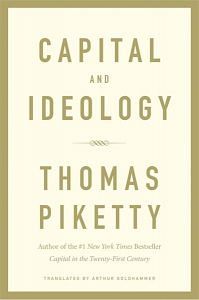Inequality is neither economic nor technological; it is ideological and political. This is no doubt the most striking conclusion to emerge from the historical approach I take in this book. In other words, the market and competition, profits and wages, capital and debt, skilled and unskilled workers, natives and aliens, tax havens and competitiveness— none of these things exist as such. All are social and historical constructs, which depend entirely on the legal, fiscal, educational, and political systems that people choose to adopt and the conceptual definitions they choose to work with.
These choices are shaped by each society’s conception of social justice and economic fairness and by the relative political and ideological power of contending groups and discourses. Importantly, this relative power is not exclusively material; it is also intellectual and ideological. In other words, ideas and ideologies count in history. They enable us to imagine new worlds and different types of society. Many paths are possible.
This approach runs counter to the common conservative argument that inequality has a basis in “nature.” It is hardly surprising that the elites of many societies, in all periods and climes, have sought to “naturalize” inequality. They argue that existing social disparities benefit not only the poor but also society as a whole and that any attempt to alter the existing order of things will cause great pain. History proves the opposite: equality varies widely in time and space, in structure as well as magnitude. Changes have occurred rapidly in ways that contemporaries could not have imagined only a short while before they came about. Misfortune did sometimes follow.
Broadly speaking, however, political processes, including revolutionary transformations, that led to a reduction of inequality proved to be immensely successful. From them came our most precious institutions— those that have made human progress a reality, including universal suffrage, free and compulsory public schools, universal health insurance, and progressive taxation. In all likelihood the future will be no different. The inequalities and institutions that exist today are not the only ones possible, whatever conservatives may say to the contrary. Change is permanent and inevitable.
Also Read: Why neo-liberal capitalism failed Dalit enterprise
Nevertheless, the approach taken in this book— based on ideologies, institutions, and the possibility of alternative pathways — also differs from approaches sometimes characterized as “Marxist,” according to which the state of the economic forces and relations of production determines a society’s ideological “superstructure” in an almost mechanical fashion. In contrast, I insist that the realm of ideas, the political ideological sphere, is truly autonomous.
Given an economy and a set of productive forces in a certain state of development (supposing one can attach a definite meaning to those words, which is by no means certain), a range of possible ideological, political, and inequality regimes always exists. For instance, the theory that holds that a transition from “feudalism” to “capitalism” occurred as a more or less mechanical response to the Industrial Revolution cannot explain the complexity and multiplicity of the political and ideological pathways we actually observe in different countries and regions. In particular, it fails to explain the differences that exist between and within colonizing and colonized regions. Above all, it fails to impart lessons useful for understanding subsequent stages of history. When we look closely at what followed, we find that alternatives always existed— and always will.
At every level of development, economic, social, and political systems can be structured in many different ways; property relations can be organized differently; different fiscal and educational regimes are possible; problems of public and private debt can be handled differently; numerous ways to manage relations between human communities exist; and so on. There are always several ways of organizing a society and its constitutive power and property relations. More specifically, today, in the twenty-first century, property relations can be organized in many ways. Clearly stating the alternatives may be more useful in transcending capitalism than simply threatening to destroy it without explaining what comes next.
The study of these different historical pathways, as well as of the many paths not taken, is the best antidote to both the conservatism of the elite and the alibis of would be revolutionaries who argue that nothing can be done until the conditions for revolution are ripe. The problem with these alibis is that they definitely defer all thinking about the postrevolutionary future. What this usually means in practice is that all power is granted to a hypertrophied state, which may turn out to be just as dangerous as the quasi sacred property relations that the revolution sought to overthrow. In the twentieth century such thinking did considerable human and political damage for which we are still paying the price. Today, the postcommunist societies of Russia, China, and to a certain extent Eastern Europe (despite their different historical trajectories) have become hypercapitalism’s staunchest allies. This is a direct consequence of the disasters of Stalinism and Maoism and the consequent rejection of all egalitarian internationalist ambitions. So great was the communist disaster that it overshadowed even the damage done by the ideologies of slavery, colonialism, and racialism and obscured the strong ties between those ideologies and the ideologies of ownership and hypercapitalism—no mean feat.
Also Read: When my father Balraj Sahni showed the ills of capitalism to me in Kashmir
In this book I take ideology very seriously. I try to reconstruct the internal coherence of different types of ideology, with special emphasis on six main categories which I will call proprietarian, social democratic, communist, trifunctional, slaveist (esclavagiste), and colonialist ideologies. I start with the hypothesis that every ideology, no matter how extreme it may seem in its defense of inequality, expresses a certain idea of social justice.
There is always some plausible basis for this idea, some sincere and consistent foundation, from which it is possible to draw useful lessons. But we cannot do this unless we take a concrete rather than an abstract (which is to say, ahistorical and noninstitutional) approach to the study of political and ideological structures. We must look at concrete societies and specific historical periods and at specific institutions defined by specific forms of property and specific fiscal and educational regimes. These must be rigorously analyzed. We must not shrink from investigating legal systems, tax schedules, and educational resources— the conditions and rules under which societies function. Without these, institutions and ideologies are mere empty shells, incapable of effecting real social change or inspiring lasting allegiance.
I am of course well aware that the word “ideology” can be used pejoratively, sometimes with good reason. Dogmatic ideas divorced from facts are frequently characterized as ideological. Yet often it is those who claim to be purely pragmatic who are in fact most “ideological” (in the pejorative sense): their claim to be post ideological barely conceals their disdain for evidence, historical ignorance, distorting biases, and class interests.
 This excerpt from Capital and Ideology by Thomas Piketty has been published with permission from HarperCollins.
This excerpt from Capital and Ideology by Thomas Piketty has been published with permission from HarperCollins.




After reading this extract, I felt I had gone back to the late sixties and early seventies, and rhetoric of leftist trade unionism. I am glad the author admits that Communism was a disaster. In fact starting with Apostlic christianity to Marx, all ideologies of equality are failures. Communism took seven decades to fail, that too after committing genocide of about 150 million people in Russia and China.
Over the line generalization gives us a quote>>>>skilled and unskilled workers is a concept of human mind. Yeah Right, the same mind says this is pure BULLSHIT.